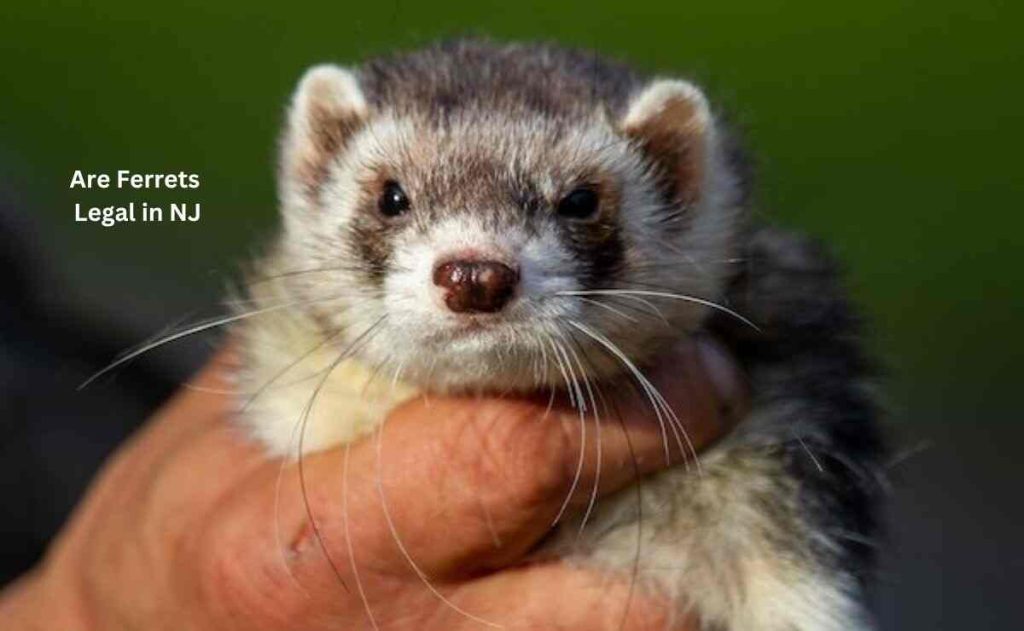Ferrets are wonderful options as pets. However, there are many states in the US that have banned ferrets. If you are living in New Jersey (NJ), then you have to ensure that ferrets are legal in NJ before keeping them as pets.
Every state has its own rules and regulations and as a responsible citizen, you must follow them. Otherwise, you may face legal consequences. It is important to do your research and check with your local authorities before purchasing a ferret.
Are Ferrets Legal In NJ?

Ferrets are considered exotic creatures and that’s why a few states don’t allow them as pets. When it comes to owning ferrets in New Jersey, you should be aware of the legalities surrounding these unique pets.
Some states have strict regulations or outright bans on ferret ownership. New Jersey allows having ferrets as pets but it has specific laws in place that allow for the legal ownership of these fascinating creatures.
You must adhere to ensure compliance with the law. It is crucial to familiarize yourself with these requirements before bringing a ferret into your home.
In New Jersey, owning a ferret is legal but there are certain restrictions. To have a ferret as a pet, you must be at least 18 years old and possess a valid ID. You need a permit that is called the Individual Hobby Wildlife Species Possession Permit.
This permit is provided by the Department of Fish, Game and Wildlife in NJ.
Fortunately, obtaining this permit is feasible, and the associated fee is relatively reasonable. Moreover, you only need one permit regardless of the number of animals you intend to own. And you must keep the ferrets indoors and cannot allow them to roam freely outside in NJ.
Also, owners should be aware of other ownership-related regulations. Providing appropriate housing, nutrition, and veterinary care for your ferret is important. Ensuring their well-being and keeping them in a safe and secure environment is essential to being a responsible owner.
Furthermore, although ferrets are legal in New Jersey, individual cities and municipalities within the state may have their own ordinances and regulations regarding ferret ownership. It is important to research and familiarize yourself with any local laws that may be in place in your specific area.
Why Do You Need a Permit To Own A Ferret In NJ?
In New Jersey, ferrets are classified as wild animals. So, keeping them as pets requires special permits. This legal stance comes with potential penalties for those who choose to defy these regulations.
Owning a ferret may seem like a harmless and straightforward choice for a pet, but in New Jersey, there are specific regulations and requirements that must be met.
There are a few reasons for this. First and foremost, it is a way for the government to track and monitor the ownership of ferrets in the state. This helps ensure the overall welfare and safety of the animals as well as the general public.
Secondly, ferrets have specific needs and behaviors that may not be suitable for everyone. They require a certain level of care, specialized diets, and proper habitats. By requiring a permit, it allows the state to ensure that potential owners have the knowledge, resources, and commitment to properly care for a ferret.
Ferrets are known carriers of certain diseases such as rabies and distemper. Requiring a permit allows the state to ensure that ferrets are properly vaccinated and pose no risk to public health.
Obtaining a permit to own a ferret in New Jersey involves a few steps. First, prospective owners must fill out an application and provide proof of residency in the state. They may also be required to provide information about their experience with ferrets and their ability to meet their needs.
Once the application is submitted, it will be reviewed by the appropriate authorities. This may include a background check to ensure that the applicant has no history of animal cruelty or neglect. If approved, the applicant will then be issued a permit to legally own a ferret in New Jersey.
Owning a ferret without a permit in New Jersey is illegal and can result in fines or other penalties. It is always best to follow the proper procedures and regulations to ensure the well-being of both the animal and the owner.
What States Are Ferrets Illegal In US?
There are a handful of states that have strict regulations or outright bans on owning ferrets as pets. These states include California, Hawaii, New York, and Washington D.C. Each of these jurisdictions has its own unique regulations regarding the ownership and sale of ferrets.
In California, for example, ferrets are classified as “wild animals” and are illegal to own as pets without a permit. Similarly, Hawaii considers ferrets to be “exotic animals” and prohibits their importation and ownership without a permit.
However, laws and regulations can change over time, so stay updated with any amendments or new legislation. It is always advisable to contact your local animal control or wildlife agency to obtain the most accurate and up-to-date information regarding ferret ownership in your area.
What Animals Can You Own In NJ Without A Permit?
In order to own certain exotic animals in New Jersey, you need a permit. However, there are some animals that can be owned without a permit.
In New Jersey, residents are allowed to own domesticated and common pets without a permit. This includes animals such as dogs, cats, rabbits, and various small mammals like guinea pigs and hamsters. These animals are considered to be low-risk and do not pose a threat to public safety.
However, when it comes to owning more exotic animals, New Jersey has stricter regulations. Without a permit, residents are not allowed to own certain species classified as exotic, potentially dangerous, or non-native wildlife.
These may include animals like tigers, lions, bears, primates, venomous snakes, venomous and large reptiles, exotic felids, exotic canids, and many other species.
Exotic animals often have specific needs and requirements that are difficult to meet in a domestic setting. Additionally, some species may pose a risk to public safety due to their size, strength, or potentially aggressive nature.
The NJ Division of Fish and Wildlife is responsible for regulating the ownership of exotic animals and can provide more information on the necessary permits. Before making any decisions about animal ownership, consult with local authorities and animal welfare organizations.
Conclusion
The ownership of ferrets can bring joy and companionship, but it is essential to remain informed and responsible in order to maintain compliance with the law. You should adhere to the regulations set forth by the state of New Jersey so that you can own a ferret without any legal complications.
Related Post
